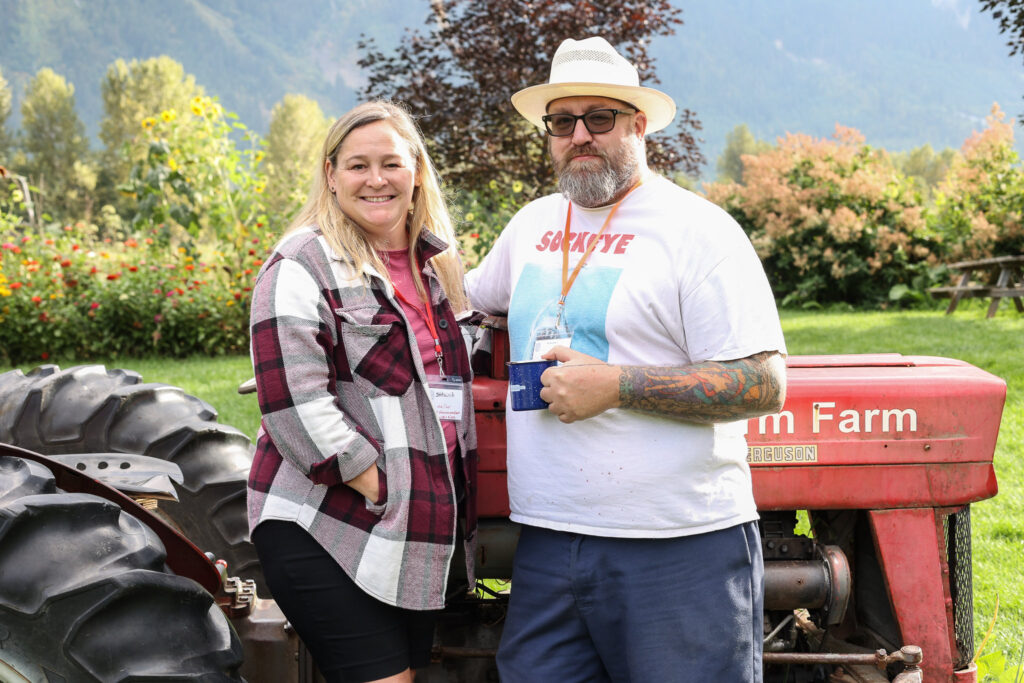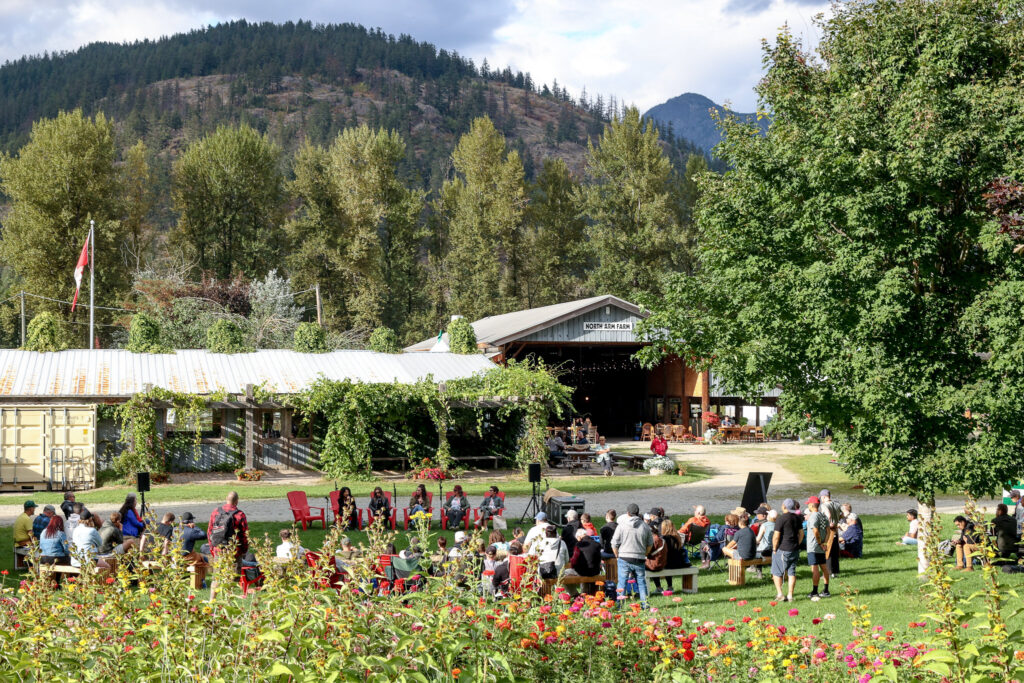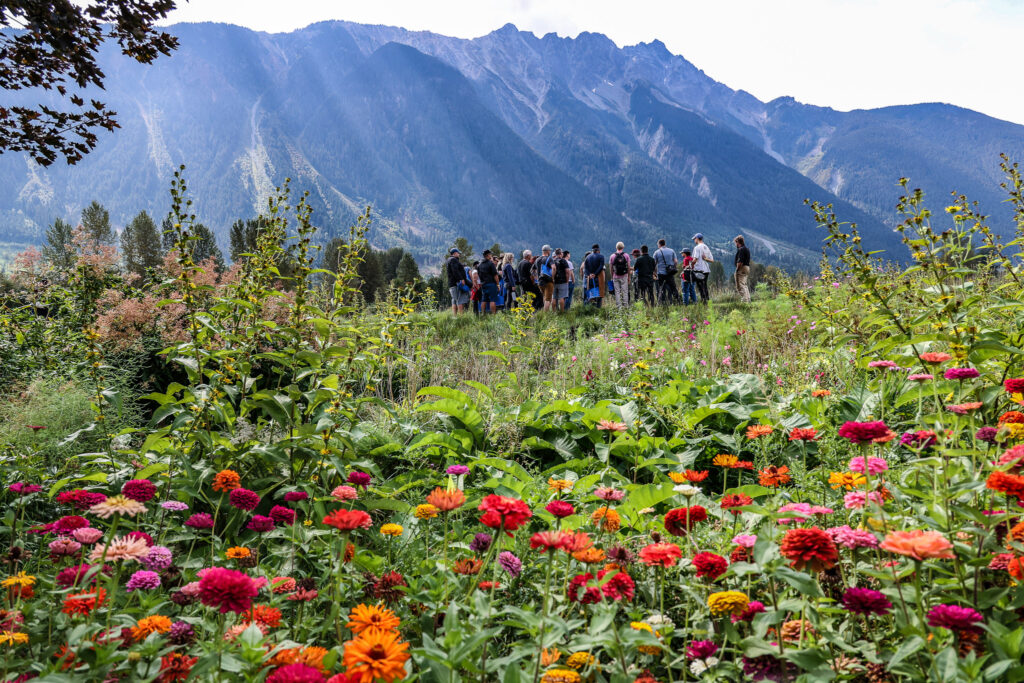In the shadow of Mount Currie (Ts̓zil in Ucwalmícwts, the language of the Lil’wat First Nation), in the lush fields of North Arm Farm in Pemberton, a group of people stand amid rows of potatoes, carrots and beets. For some, this place is home. For others, it’s perhaps one of the first times they’ve set foot on a farm, which seems counterintuitive given that every day they work with the produce grown here. This connection — to the land, to the produce, to other people — is why they’re here. This is CooksCamp.
“We all know the industry is broken,” says Robert Belcham, one of Vancouver’s leading chefs and the founder of CooksCamp. “It can be a toxic workplace rife with misogyny and racism. But when people are treated right, it can be one of the most creative and rewarding sectors to work in.”
Belcham has opened 18 restaurants, 13 of his own (with partners), during his 30-year-long career, the most recent being Popina Canteen and Monarch Burger. He was recognized as Chef of the Year at the 2009 Vancouver Magazine Restaurant Awards and, for 15 years, has been on the board of the Chefs’ Table Society of B.C., which advocates for sustainability, camaraderie and education among chefs.
But even a seasoned chef and restaurateur like Belcham wasn’t ready for COVID, which effectively shut down all of his operations. However, this gave him time to reflect on his contribution to the industry — and on how he might be part of the problem.
“If we want to attract the best, we have to take care of them,” says Belcham. “We have to look at the times they work, pay structure, living conditions, and take them out from behind the stove so they can find connections outside of the kitchen.”
And that’s what he’s been focused on for the last five years. Inspired by the 2010 Canadian Chefs’ Congress held in the Cowichan Valley, a first-of-its-kind gathering of chefs and cooks in Western Canada, Belcham developed his own two-day event.
This overnight camp brings over 200 chefs, cooks, bakers, butchers, owners, managers and other hospitality workers to the fields of Pemberton in the fall. Here, they learn about everything from butchery, wild foraging and knife sharpening to mental health, finding local producers and the future of the industry.
“The idea of CooksCamp was to take people out of a hot kitchen and place them in a beautiful, enriching environment that would foster open-mindedness to new ways and ideas, as well as giving them a connection to community,” says Belcham. “It’s an opportunity to rub shoulders with some of the best in the industry over food, around the campfire.”
When he envisaged a location for his camp, Belcham immediately thought of North Arm Farm, which has been supplying restaurants in the Sea to Sky Corridor and Vancouver for more than 40 years.

“They have a very deep connection to the chefs and restaurants here,” says Belcham. “It is also the most beautiful farm in this part of B.C. Mount Currie is hard to beat as a backdrop to the festivities. They were set up for hosting events like CooksCamp, and lastly, they are just really cool people to work with, who really understand and appreciate what we are trying to accomplish.”
Award-winning executive chef James Walt, who oversees Toptable’s Whistler restaurants Araxi, Il Caminetto and Bar Oso, has been part of the camp since its inception. He echoes Belcham’s words about the changes needed.
“I went through the old-school system, where long hours and low wages were the norm, but things are changing,” says Walt. “The next generation is smart. They’re looking for more. I oversee around 220 people, and I know that the better I do for them, the better they do for me. But this requires awareness of people, watching and coaching. In Whistler, people want to ski and bike, and we need to shift to accommodate that because it’s healthier and gives us the best version of our people.”
Both Belcham and Walt say one of the best things at camp is the family meal, where they use their tented, 2,000-square-foot outdoor kitchen to cook for the whole camp.
“The family meal is so important because it represents the same thing as it does in a restaurant — taking care of the people who work hard every day,” explains Belcham. “That’s why everyone is invited to participate in creating it. We have a group of five to eight chefs who lead, and it’s always headed up by a culinary legend. This year, it’s Scott Jaeger, formerly of The PearTree, with Celeste Mah and Ross Larkin of Portage Restaurant [in St. John’s, Newfoundland].”
Another important gathering is the cultural dinner, which always happens on the first night of camp. Last year, Antonio Martin of Haven Kitchen + Bar led 12 Filipino chefs from the Lower Mainland in creating a boodle fight experience.
“When Chef Antonio initially came to me with the idea, I said ‘A boodle what?’ But then the dinner came together, with the amazing chefs preparing traditional and non-traditional dishes, which they served on long tables. All the food was poured out onto beautiful rice, and then you dive in and eat with your hands, unencumbered by status or designation or class. You’re all sharing this delicious food, celebrating family and community. It was a beautiful meal and experience.”
They’re expecting 250 people for their fifth camp, happening September 10 to 12, 2025. From titans of industry to newbie cooks fresh out of school, the camp draws people from all over Canada to the fields of Pemberton.

“CooksCamp is all about community,” says Walt. “The industry can be isolating, but there are other chefs and cooks out there who you can learn from and support. Last year, we had a discussion about addiction, something I didn’t know much about. I choked up — the sharing can be emotional. It’s one of the strengths of the camp that it creates an atmosphere where people open up. I’m excited to bring more of my team to camp this year.”
As halibut season ends and salmon season begins, as summer’s produce is harvested and pumpkins take over the fields, it’s also a transformational time for cooks and chefs to come together in a beautiful environment and focus on nourishing themselves.

